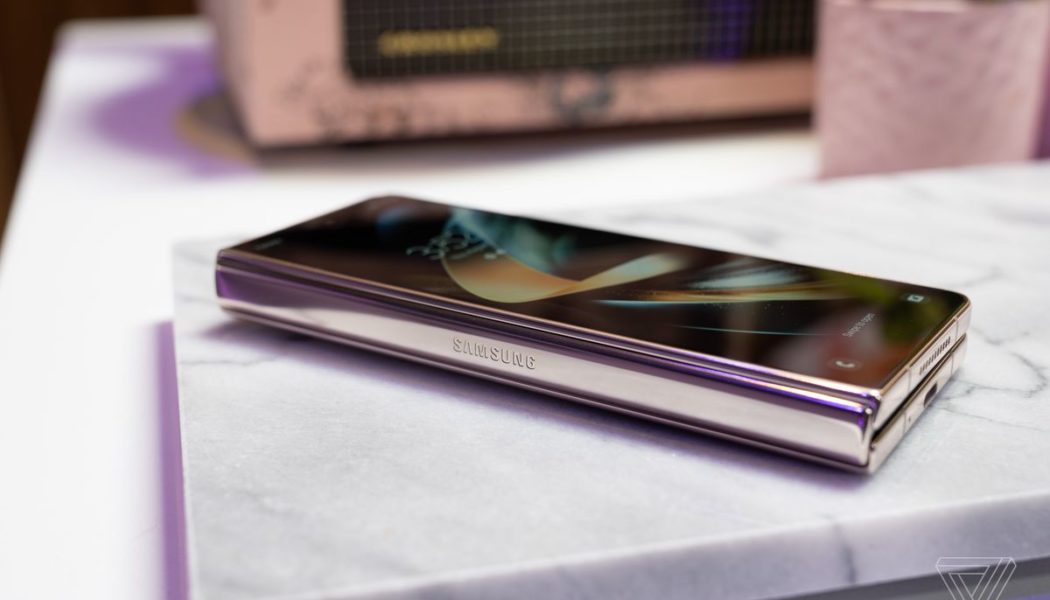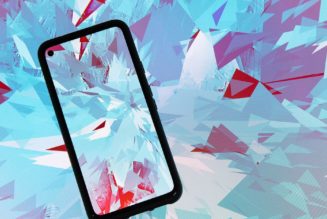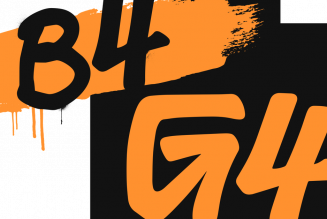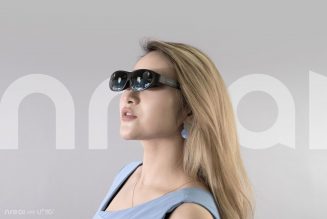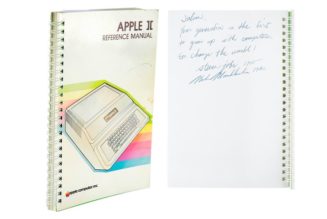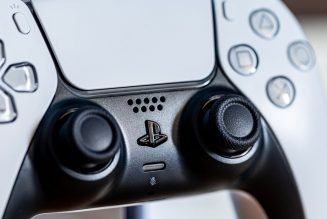Samsung, purveyor of the only serious foldables available on a global scale, is taking a victory lap with the Galaxy Fold 4. As is tradition, the company has announced full details after a parade of teases and leaks, confirming what we strongly suspected: it’s not a huge update.
The overall design is ever so slightly sleeker, with a slimmer hinge and bezels. This is mostly cosmetic and doesn’t make much of a difference to how compact the phone folds down — just the difference of a fraction of a millimeter (15.8mm thick at the hinge and 14.2mm where the sides meet). It weighs a little less: 263 grams compared to the Z Fold 3’s 271 grams. It’s still a heavy phone, which is to be expected for something that doubles as both a phone and a small tablet.
I can’t say it was noticeably slimmer or lighter than I expected, but the finish is fitting of a flagship device. It doesn’t feel prototype-y, either. It’s reassuringly solid, and I don’t feel like it needs to be handled with extra care. I’m a little nervous about how it will deal with the dusty environment that is the bottom of my purse, but there’s just one way to find out, so stay tuned.
:no_upscale()/cdn.vox-cdn.com/uploads/chorus_asset/file/23933321/DSC03310_fold_4.jpg)
The hinge is still somewhat stiff by design so that it will stay put in Flex mode, but the opening-closing motion feels smooth, at least in the demo units Samsung had on display last week. The Fold 4 remains IPX8 rated for water resistance. And like a true 2022 flagship, it includes a Snapdragon 8 Plus Gen 1 chipset with 12GB of RAM, starting with 256GB of storage and going all the way up to 1TB.
The Fold 4 gets a newer 50-megapixel main camera, a more useful 3x telephoto camera, narrower bezels, and a slimmer hinge. There’s a little more real estate on the front display since it’s a few millimeters wider. It’s not much, but it does make the display feel a little less cramped and a little more like a normal phone. There’s still a gap when the phone is folded closed; Samsung hasn’t achieved optimal foldable flatness yet.
A handful of software updates aim to improve the multitasking experience, and some changes to the display structure and its all-important screen protector should make it more durable in the long run. But that’s the gist of it; the $1,799 price is sticking around another year, making it an expensive, slightly more mainstream flagship option.
:no_upscale()/cdn.vox-cdn.com/uploads/chorus_asset/file/23933320/DSC03303_fold_4.jpg)
With this update, the Fold 4 finally has a camera array fitting of a flagship phone. Last year’s 12-megapixel main camera has been swapped out for a 50-megapixel sensor that matches what’s available on the S22 and S22 Plus, including an f/1.8 lens and optical stabilization. It should be a noticeable improvement, but it’s not yet up to the level of what you get in the S22 Ultra.
The Z Fold 3 included a 2x telephoto lens, which has thankfully been upgraded to a 3x optical zoom — 2x doesn’t get you very far. Space zoom is available now, too, so you can use digital zoom all the way out to 30x even though you probably shouldn’t. These aren’t so much upgrades — more like the Fold 4 catching up to what the rest of Samsung’s flagships offer.
The Z Fold 4’s cover screen still measures 6.2 inches diagonally, but it’s three millimeters wider to add a little more breathing room to a very narrow display. The main screen is still 6.7 inches, but it’s more durable — 45 percent stronger, according to Samsung, thanks to a stronger ultra-thin glass. The crease is still there. It’s not a distraction with the phone fully unfolded, but you’ll see it when you look for it. The adhesive on the preapplied screen protector is stronger this time around in an attempt to alleviate the nasty bubble problem owners of earlier Fold models commonly encountered.
Both screens are still OLED panels with 120Hz adaptable refresh rates. The main screen is still compatible with Samsung’s (sold separately) foldable-specific S Pen — still no Note-style silo, though, just an S Pen-friendly case. And you still can’t use the S Pen with the cover screen. The Fold 4’s under-display camera is hidden a little bit better this time around. It’s still a 4-megapixel sensor, but Samsung says that changes to the pixel array on top of it make it less of a distraction and also improve image quality.
:no_upscale()/cdn.vox-cdn.com/uploads/chorus_asset/file/23933326/DSC03388_fold_4.jpg)
The Fold 4 ships with One UI 4.1.1 based on Android 12L, with some software tweaks aimed at improving the multitasking experience. The taskbar has been moved from the side to the bottom of the screen. There’s a new touchpad feature in Flex mode, too, which gives you a little cursor to drag around the top half of the screen like a tiny laptop. It’s cute, but I’m not sure I’d ever use it.
Preorders for the Galaxy Z Fold 4 start today, with availability on August 26th from Samsung, carriers, and third-party retailers — everywhere all at once. There will be gray-green, beige, and phantom black colors, with an extra burgundy option sold only by Samsung.
Photography by Allison Johnson / The Verge
